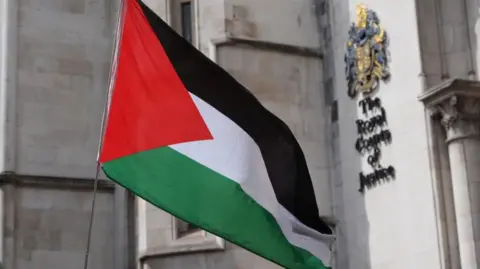In a significant development in the United Kingdom, three individuals have been charged with supporting the group Palestine Action, which has been designated as a proscribed terror organization. The prosecution follows a protest that took place in central London, marking a controversial chapter in the ongoing discourse surrounding the Israeli-Palestinian conflict. The individuals facing charges are Jeremy Shippam, aged 71, hailing from West Sussex; Judit Murray, also 71, from Surrey; and Fiona Maclean, 53, who resides in Hackney. They are scheduled to appear at Westminster Magistrates’ Court on September 16, according to the Metropolitan Police.
The arrests were made during a demonstration in Westminster on July 5, where the trio allegedly expressed support for Palestine Action. Under UK law, supporting this group constitutes a criminal offense. The legal ramifications for individuals expressing membership or support for Palestine Action can lead to severe consequences, including a maximum sentence of 14 years in prison. Such a stark legal response underscores the government’s stringent stance on activities perceived as supportive of terrorism.
This case not only marks the first instance of such charges being brought in England and Wales but also occurs in the context of additional protests anticipated in London. Organizers expect over 500 individuals to gather in London’s Parliament Square to show support for Palestine Action. The Metropolitan Police have been vigilant in their response to these protests, with Commander Dominic Murphy, head of the Met’s Counter Terrorism Command, indicating a broader crackdown. He mentioned plans to send case files regarding an additional 26 individuals arrested during the same protest day to the Crown Prosecution Service for further consideration.
As the legal landscape concerning Palestine Action unfolds, Commander Murphy has issued a caution to potential demonstrators. He advised that individuals planning to attend the upcoming rally should carefully consider the potential criminal implications of their involvement. This warning reflects a growing tension between civil liberties and national security concerns in contemporary Britain, particularly relating to protests that engage with sensitive geopolitical issues.
The background to these events involves the controversial ban on Palestine Action itself, which has been a topic of legal and political discourse. The High Court, in a ruling on July 30, determined that the proscription of Palestine Action, which has been involved in direct action protests such as break-ins at defense firms linked to Israel, merits a judicial review. Such protests have included actions like the incident at RAF Brize Norton in Oxfordshire in June, where activists caused an estimated £7 million in damages by vandalizing two Voyager planes. The government’s quick response, led by Home Secretary Yvette Cooper, labeled the actions as “disgraceful,” referring to Palestine Action’s perceived history of engaging in significant criminal damage.
The legal proceedings against Shippam, Murray, and Maclean appear to be part of an ongoing effort to mitigate what the government sees as threats posed by extremist groups, even as advocates for Palestine Action challenge the legality and moral validity of such proscription. The juxtaposition of free expression against the backdrop of national security raises important questions about civil rights, the definition of terrorism, and the boundaries of political activism in the UK. As this situation develops, it promises to spark further discussion about the implications of the law on public demonstrations and individuals’ rights to express solidarity with causes that are deemed controversial or threatening by authorities.
In conclusion, the charges against these three individuals signify not just a legal issue but a complex intersection of ethics, national security, and civil rights, as the UK navigates its position on matters deeply rooted in international conflict. Their upcoming court appearance in mid-September will likely be closely watched, both within the UK and internationally, as it may set precedents for how similar cases are addressed in the future.











